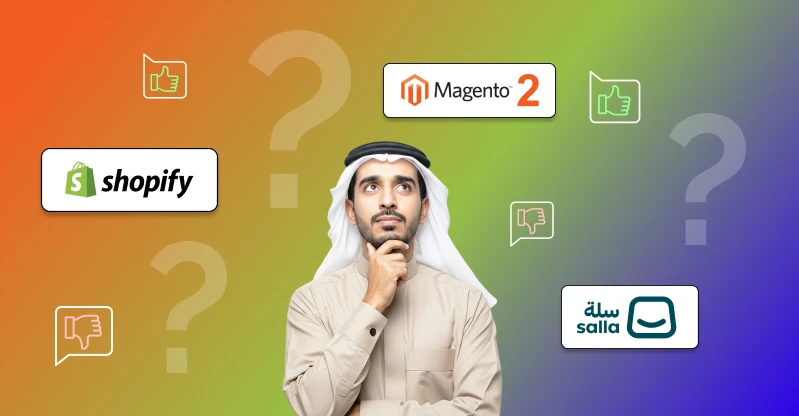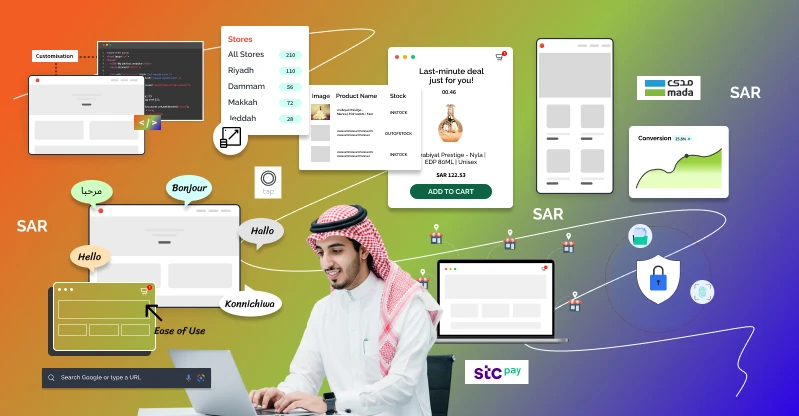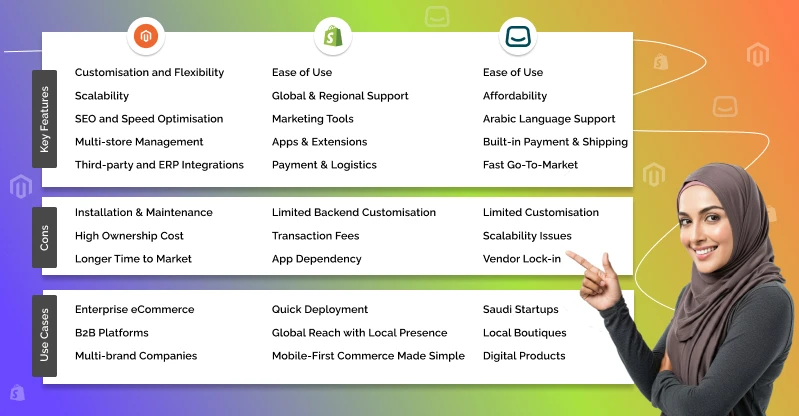Shopify, Magento 2 and Salla: Pros, Cons & Use Cases For Middle East Brands

Table of Contents
Are you struggling to decide which eCommerce platform is best for your business? Many Saudi brands are faced with the same dilemma.
With Vision 2030 driving digital transformation forward, providing a seamless online purchasing experience has become a primary objective.
However, without sufficient insight, brands sometimes end up selecting a platform that does not meet their requirements.
To make things easier, let’s look at the three widely used platforms in Saudi Arabia, Shopify, Salla, and Magento, and how they may be used to achieve diverse business objectives. Each platform has its own set of capabilities, and the best option will ultimately be determined by your unique project needs.
Magento development (Adobe Commerce) is for the brands requiring complete control, scalability, and advanced-level workflows with lots of customisation and worldwide reach.
With developments such as Hyvä Themes, Magento 2 can connect with global standards with local development potential, making it even more desirable for Middle Eastern businesses.
On the other hand, a Shopify agency highlights how the platform offers a low-profile, flexible, and scalable option for businesses of all sizes, specifically trusted by small and medium enterprises with a massive app ecosystem and fast setup.
With Shopify Plus features, brands can now get better features, including a custom checkout experience, multiple integrations, and POS support, which will help ensure your brand can run multiple stores at a time.
Salla is designed particularly for merchants who need a store for their local needs. By offering an easy-to-use SaaS platform and effortless integration with local payment gateways and logistics platforms, it’s helping the local businesses.
This blog provides a comprehensive contrast of Shopify, Magento, and Salla, making Middle Eastern businesses opt for the platform most suitable to their development potential, technical ability, and business requirements.
Overview of Magento 2 (Adobe Commerce)
Magento is a powerful open-source and enterprise eCommerce platform developed to serve gargantuan, high-level businesses.
It provides unparalleled flexibility, enabling brands to customise their storefronts, product catalogues, and workflows fully.
With the inclusion of the Hyva Magento theme, a contemporary frontend solution is provided. It helps to deliver lightning-fast site speeds, outstanding UX, and better Google Lighthouse scores.
Studies say Magento has a strong position in the Saudi Arabia eCommerce market, accounting for 41.22% of total platform sales in 2025.
From multi-store functionality to ERP integration and advanced promotions, Magento 2 is perfect for Middle Eastern retail, manufacturing, distribution, and B2B trade companies.
Key Features
Customisation and Flexibility
Magento 2 offers complete design and logic customisation. Hyvä makes frontend development easier and simplifies UI updates with a fast, cutting-edge tech stack.
Scalability
Magento and Hyvä make sure performance is not compromised as your store scales to handle thousands of SKUs, deep catalogues, and high traffic.
SEO and Speed Optimisation
A magento Store is equipped with superior SEO functionality, while Hyvä’s light architecture enhances Core Web Vitals—a must for Gulf region mobile shoppers.
Multi-language and Multi-store Management
You can manage French, English, or Arabic stores from a single backend in Magento, perfect for Middle Eastern businesses going cross-border.
Third-party and ERP Integrations
Magento integrates seamlessly with ERPs such as SAP, Oracle, and Zoho, a significant drawback in products such as Salla.
Unmatched Flexibility
Ideal for B2B and B2C alike, Magento allows you to tailor every aspect of the shopping process.
Enterprises-Grade Functionality
Best for manufacturers and retailers who require customised tiered customer segmentation, price rules, or advanced promotions.
Speed and UX with Hyvä Themes
Hyvä gives you a new frontend solution that is faster, simpler, and gives Magento the SaaS-like experience–without sacrificing control.
Multi-Region & Multi-Currency Support
Magento includes simple management of multi-language and currency configurations for Middle East expansion across GCC nations.
Reduced Frontend Development Expenses
Hyvä shortens frontend development by at least 50%, which allows Middle Eastern companies to incur reduced costs for long-term development and upkeep.
Cons:
Complex Installation and Maintenance
You will require a team of Magento developers or a professional agency to install and maintain the store, as it is not for beginners.
High Ownership Cost
Though it is open source, hosting, development, and extensions later on became expensive.
Longer Time to Market
It will take months or even weeks to develop a complete Magento store from scratch.
Shopify Overview
Shopify is a cloud-based SaaS eCommerce platform for merchants in need of ease, speed, and trust. It offers a hosted solution with payment, security, and marketing tools embedded.
Shopify is widely used across the world and is being increasingly adopted by Middle Eastern SMEs because it is easy to use, scalable, and multi-language (including Arabic via apps and themes).
Key Features
Ease of Use:
Shopify offer drag-and-drop features and an easy dashboard for creating your store with ease.
Global & Regional Support:
Their multi-currency and multi-language functionality is designed for all countries.
Marketing Tools
With its built-in SEO, email marketing capabilities, and social media, Shopify helps to deliver seamless marketing support.

Apps & Extensions
Shopify offer a mass marketplace for added functionality to deliver a better experience to the end-users.
Payment & Logistics
Shopify offer regional gateway and global shipping carrier support to ensure an end-to-end payment and logistics experience.
Advantages of Shopify
Quick Setup
Shopify deliver an open online store with faster loading, pre-styled themes and a drag-and-drop editor.
Minimum Tech Know-how
No coding required, perfect for small businesses and entrepreneurs.
SaaS Hosting
Get secured, hosted, and auto-updated support delivered by Shopify.
Less Maintenance
Shopify comes with lower maintenance, which reduces the downtime for merchants on sales and helps to deliver a better experience.
Scalable
This platform can handle an unlimited number of catalogues and can boost traffic for small to mid-sized businesses.
Enterprise Ready
With the Shopify Plus capabilities, leading brands and growing stores can get enterprise-ready solutions. Thousands of apps can be added, including marketing and analytics features.
Payment Integration
Shopify can handle numerous payment gateways and local payments seamlessly to deliver a hassle-free experience.
Disadvantages of Shopify
Limited Backend Customisation
Can’t fully customise code for complex workflows or features.
Transaction Fees
Additional fees are required unless using Shopify Payments as the gateway.
App Dependency
Complex features tend to require third-party paid apps, thereby increasing expense.
Complex Promotions
Certain discount structures need apps or hacks.
Limited Deep Logic Control
Can’t compete with Magento’s complete back-end process control.
Overview of Salla
Salla is an online shopping platform for cloud-based services specifically for Arabic-language needs brands in the Middle East.
It has an Arabic-focused, intuitive interface that makes it possible for small- to medium-sized companies to establish internet stores without having technical knowledge.
Being an end-to-end hosted SaaS solution, Salla manages infrastructure, maintenance, and security so business owners can concentrate on sales and expansion.
It is designed to integrate easily with local payment gateways such as STC Pay and Mada, and regional logistics partners, facilitating instant rollout in the Saudi market.
Key Features
Ease of Use
Salla is a user-friendly system, which makes it easy for users to set up and manage their stores without requiring technical expertise.
Localised Support
Provides Middle Eastern market-specific functionality and support, including support for languages and currencies.
Integrated Marketing Tools
Provides built-in SEO, email marketing, and social media integration tools for enhanced online visibility.
Responsive Design
Ensures online stores are responsive to the increasing number of mobile buyers.
Pros
Ease of Use
Salla is made for business owners who are not tech-savvy. It only requires a few clicks to set up an online store—no coding.
Affordability
Salla features competitive subscription fees with hosting, updates, and customer support.
Arabic Language Support
Its Arabic language-based native platform is one of the key strengths for Gulf merchants.
Built-in Payment and Shipping
Salla features popular regional payment gateways and shipping companies such as STC Pay and Aramex, and makes them easy to integrate.
Fast Go-To-Market
Small shops can have a store up in hours, perfect for product-market fit testing.
Cons:
Limited Customisation
Salla’s customisation is limited to existing themes and features, unlike Magento.
Scalability Issues
As you grow your store, you might realise you outgrow Salla’s feature set. It’s not built for stores with huge product catalogues or custom backend requests.
Vendor Lock-in
You’re bound to Salla’s update roadmap, price, and infrastructure.

Use Cases
Best Use Cases for Magento 2:
- Enterprise eCommerce: High-product catalogue businesses with a global reach and complicated needs.
- B2B Platforms: Wholesalers and manufacturers that need customised prices, quotes, and account management.
- Multi-brand Companies: Managing many storefronts from one backend.
Shopify Best Use Cases:
- Quick Deployment: Perfect for small and medium-sized businesses looking to get started quickly.
- Global Reach with Local Presence: Ideal for startups aiming to grow both locally and internationally.
- Mobile-First Commerce Made Simple: Designed for stores that need app-based functionality but don’t want to invest much in development.
Best Use Cases for Salla
- Saudi Startups: New startups that must go online in a hurry with Arabic-first solutions.
- Local Boutiques: Small fashion, beauty, or electronics boutiques with a localised focus.
- Digital Products: Selling courses, eBooks, and subscriptions with low technical overhead.
Key Feature Differences Between Magento, Shopify, and Salla in the Saudi Market
Regional Relevance
Salla was designed with the Saudi and Gulf regions in mind. Its Arabic-oriented interface and native extensions to regional services make it ideal for businesses selling to Arab customers.
Magento is an internationally well-known platform that needs extra localisation through language packs and third-party extensions to become regionally popular.
While Magento has Arabic support, Salla provides native Arabic support, which simplifies onboarding for local entrepreneurs who are beginning to adopt digital commerce.
Shopify splits the difference with Arabic themes, currency support, and VAT apps. While not natively Arabic-first like Salla, Shopify can also meet the needs of local and international business requirements adequately.
Language and RTL Support
Salla has RTL Arabic design and admin panel RTL support natively, providing the natural and intuitive feel Arabic-speaking merchants require.
Magento does provide RTL, but as a custom theme or third-party solution, which adds to development time and go-to-market delay.
Shopify provides RTL capability through apps and theme customisation, which is perfect for SMEs that require Arabic support without heavy technical involvement.
Overall, Salla provides the sleek Arabic experience, Magento is complicated and customisable to a high degree, and Shopify provides an in-between.
Ease of Use
Salla is geared toward non-technical users, providing drag-and-drop capabilities and an intuitive dashboard that enables entrepreneurs to control their stores themselves.
Magento is more suited to technical users or users who have development agencies because of its complicated learning curve and disorganised backend.
Shopify is in between: easy for non-tech users to obtain and manage stores at speed, but still providing control via apps and integrations so that it is fine for growing businesses to want ease and control.
Customisation Flexibility
Magento 2 is an open system with complete control of the codebase so that companies can customise everything from the UI to backend logic.
This level of customisability is necessary for businesses with bespoke workflows or intricate operational requirements at the expense of development cost and time.
Salla, as a SaaS offering, limits customisability to its theme builder and integrated app combinations, which works for small businesses but eventually becomes limiting as businesses expand.
Shopify facilitates theme-based as well as app-based customisations, more flexible than Salla but less in weight than Magento, without the ability to offer Magento’s full backend customisation.
Scalability
Magento is built for colossal operations like thousands of products, multiple stores, and high concurrent traffic levels with the right infrastructure.
Salla, aimed at small and medium-sized businesses, can experience poor performance when traffic and catalogues increase.
Shopify has medium to high scalability, particularly with Shopify Plus, to support expanding SMEs effectively, but extremely large-scale enterprises might still need custom solutions. Magento is appropriate for sustained business expansion, Shopify for expanding businesses, and Salla for start-up businesses.
Store Management Features
Magento’s higher-end store management features include bulk import/export of products, customer segmentation, multi-vendor setups, and sophisticated workflows.
Salla’s dashboard is not as sophisticated, offering inventory and order management ease for SMEs with straightforward processes.
Shopify also possesses a robust middle ground with store management simplicity, automated inventory, and easy third-party app integration, enabling SMEs to grow without undergoing Magento’s complexity.
Promotion Management and Integration Capabilities
Magento has very advanced promotion campaigns, dynamic pricing, and advanced ERP integrations, and hence it’s very suitable for operationally advanced businesses.
Salla has limited promotion capabilities but no advancement for complex workflows or big campaigns. Shopify’s app store is adequate for promotion and discounting, and is more flexible in offering to SMEs than Salla, but less mature than Magento.
Multi-store and Multi-language Support
Magento can handle several stores, languages, and currencies on one backend, which is perfect for internationally branded and regionally focused eCommerce companies with several Arabic and English-speaking markets.
Salla has excellent support for Arabic but poor multi-language or multi-store support. Shopify offers multi-language and multi-currency, particularly with Shopify Plus or with third-party applications, providing better all-around support for regionally focused business development than Salla.
Mobile Responsiveness
Salla is constructed with mobile-first themes to keep up with the common usage of smartphones in the Gulf and make quick mobile browsing possible.
Magento needs mobile optimisation via theme choice or Progressive Web App (PWA) installation to bring high-performing results.
Shopify offers responsive themes out of the box and has good mobile commerce support, making it a suitable option for SMEs with heavy mobile traffic reliance without requiring extra development.
| Feature | Magento 2 (Adobe Commerce) | Shopify | Salla |
| Pricing | Open Source: Free (self-hosted) Adobe Commerce: ~$22,000/year Dev & Hosting: ~$3,000–$20,000+ | SaaS: $39–$399/month + paid apps | SaaS: SAR 0, 99, 299, 499 (includes hosting, support, updates) |
| Localisation & Legal Compliance | Needs third-party modules for Arabic, RTL, SAR, and VAT compliance | Apps required for Arabic/RTL & VAT | Native Arabic, RTL layout, SAR/AED currencies, VAT-enabled invoices |
| Customisation | Full code access & unlimited flexibility | Theme & app-based customisation | Limited to themes & available apps |
| Scalability | High, enterprise-ready | Moderate to high | Low to moderate |
| ERP Integrations | Strong, extensive ERP & third-party integrations | Some via apps | Limited |
| SEO & Marketing | Advanced, enterprise-level | Advanced | Basic |
| Hosting & Maintenance | Self-hosted or Adobe Cloud | Fully hosted | Fully hosted |
| Time to Market | Weeks–months | Days–weeks | Hours |
| Support | Global developer & agency network | Global support & large community | Local Arabic support |
| Migration & Portability | Advanced migration tools support complex migrations | Apps & third-party tools available | Limited import/export, closed SaaS model |
| Ecosystem & Growth | 5,000+ extensions, 300K+ developers, Adobe Cloud Suite integration | 8,000+ apps, huge global ecosystem | Fast-growing in Saudi & the UAE, VC-backed, SME-focused |
Support for Payment Gateway Options
Salla natively connects with regional logistics providers such as Aramex and SPL, and regional payment gateways such as Mada, STC Pay, Tap, and HyperPay, offering seamless configuration for Saudi consumers.
Magento can also be connected with such services, but it demands API-level integration, which is costly and time-consuming. Shopify offers regional payment and shipping integrations in the form of apps and Shopify Payments, which is easier to set up than Magento but not as natively integrated as Salla.
SEO and Digital Marketing
Magento offers advanced SEO features, marketing automation integration, and complete meta tag, URL path, and sitemap control, giving international brands a massive digital edge.
Salla offers basic SEO and marketing features, adequate for local SMEs to list in GCC search engines. Shopify offers robust SEO capability out of the box and application-based marketing features, offering more features than Salla but less advanced than Magento’s enterprise capabilities.
Analytics and Reporting
Magento offers advanced analytics as well as supports integration with Google Analytics, Mixpanel, or Adobe Analytics for providing advanced reporting.
Salla offers key information for revenue, orders, and traffic sources, ideal for small businesses that want simplicity without compromising on clarity.
Shopify enables analytics and app-based reporting, filling in the gap between Salla and Magento by providing actionable insights for growth-stage businesses and SMEs.
Third-Party Extensions
Magento boasts a behemoth app store of thousands of ERP, AI, search, and other premium feature extensions with nearly limitless customisability.
Salla has a limited, human-curated app store centred around local requirements, prioritising simplicity over extendibility. Shopify boasts a very large international app store, providing more functionality than Salla with fewer complications than Magento, ideal for companies looking for plug-and-play functionality.
Security and Compliance
Magento places security patch management, SSL certificates, and GDPR regulation compliance on its users unless it is hosted in Adobe Commerce Cloud.
Salla, being a SaaS platform, manages security updates and Saudi eCommerce regulation compliance, such as VAT invoicing, automatically.
Shopify offers hosted security, PCI compliance, and automatic updates with a middle level of convenience and control between Salla and Magento.
Hosting and Performance
Magento demands server hosting on a powerful server, ideally cloud hosting such as AWS or Adobe Commerce Cloud, where one has total control but requires technical skills.
Salla offers managed hosting with maximum speeds, making local business performance management very easy.
Shopify offers cloud-hosted performance out of the box, which is easier than Magento and on par with Salla for SMEs that require guaranteed speed without the technical configuration.
Total Cost of Ownership
Magento is more expensive to host, develop, protect, and extend, and thus is only ideal for larger-budget companies and those with technical staff.
Salla has inexpensive monthly memberships of SAR 0, which makes the startup or individual seller’s initial cost inexpensive.
Shopify’s add-on app-based subscription model keeps it affordable for SMEs but expandable with increasing business demands.
Go-to-Market Time
Salla enables companies to deploy stores in hours with pre-set themes and integrations, best suited for quick outcomes.
Magento takes weeks to months based on complexity, and is best suited for extended business deployments. Shopify can be deployed within days, quicker than Magento but slower than Salla for Arabic-first websites.
Support and Community
Magento has a massive global developer and agency community with often top-notch but expensive support.
Salla offers region-specific Arabic support via chat, tutorials, and webinars, which is beneficial to novice Middle Eastern sellers.
Shopify provides international 24/7 support, an enormous community, and access to regional partners with a mix of local and global support.
Migration and Portability
Magento sites are very portable and can be ported from one platform, version, or host to another with the right tools, providing businesses with long-term flexibility.
Salla’s model restricts portability and causes some vendor lock-in but seldom affects in-store merchants who are concerned with sales.
Shopify comes with export and migration application tools, providing mid-level flexibility between Salla’s model’s limited portability and Magento’s open-ended control.
Platform Durability and Future Expansion
Magento continues to be enhanced by Adobe, putting money into headless commerce, AI, and enterprise applications, making it a future-proof digital transformation platform.
Salla is rapidly growing in the Middle East and is backed by regional VC, concentrating on AI solutions and growing its app marketplace for local enterprises.
Shopify keeps developing across the globe, incorporating AI functionality, headless commerce enablement, and enterprise scalability with Shopify Plus, offering businesses a balance between global growth opportunities and regional adaptability.
Conclusion
Salla is ideal for Saudi SMEs seeking speed, simplicity, and affordability. Arabic-first design and local integrations make Salla an excellent choice for startup founders.
Shopify is balanced, offering ease of use and scalability for SMEs or startups seeking a SaaS solution with international reach and a wide app store ecosystem.
Magento 2, particularly with Hyvä Themes, is the heavy-duty solution for businesses needing full control, complex workflows, and long-term expansion in the Middle East region and overseas.
For companies planning regional or global expansion, Magento 2 and Shopify outperform Salla. Magento 2 has unparalleled scalability, complete backend flexibility, and professional workflows, so it’s best for companies with sophisticated operations.
Book a free consultation with the Saudi Arabian leading eCommerce expert to understand which platform is best suited to your specific business requirements.
FAQs
 Which eCommerce platform is best for big brands?
Which eCommerce platform is best for big brands?
Magento 2 is perfect for big firms because it supports scalability, advanced workflows, and customisation. Shopify is perfect for medium-sized firms, while Salla is perfect for small regional startups.
 Is Shopify suitable for companies in the Middle East?
Is Shopify suitable for companies in the Middle East?
Shopify is very popular in the region for its SaaS convenience, quick setup, and app store. Third-party apps can support local payment and logistics integrations, though.
 Why is Magento 2 necessary for global expansion?
Why is Magento 2 necessary for global expansion?
Magento 2 is multilingual, multi-currency, and advanced-level integration-friendly, so it’s future-proof for regionally or globally expanding businesses.
 In what way is Salla unique as opposed to Shopify and Magento 2?
In what way is Salla unique as opposed to Shopify and Magento 2?
Salla is particular to Arabic-speaking business owners, with native Arabic language, Saudi and GCC payment gateway and logistics integration.
 Which platform is the best value for startups?
Which platform is the best value for startups?
Salla is very value for money for local startups, Shopify is cost vs. scalability, and Magento 2 is more expensive to set up but offers enterprise-level flexibility.



